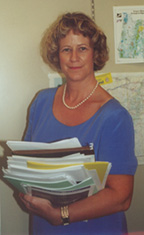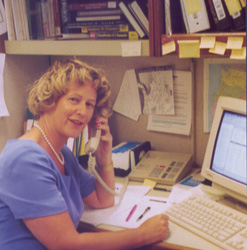geotimesheader
Political
Scene
Sustaining
the Conversation
Eileen McLellan
This fall I finish a year working as a scientist on Capitol Hill. As
the American Geological Institute’s Congressional Science Fellow, I have
been one of about 30 scientists working as a Hill staff member. Serving
as a science adviser on the staff of Sen. Ron Wyden (D-Ore.), I learned
that democracy is not an abstract concept, but a day-to-day conversation
between citizens and their elected officials. Fundamentally, the job of
the staffer is to facilitate that conversation by keeping a senator or
representative informed of what their constituents are saying, and by explaining
to those constituents how their congressional representative makes decisions.
I had no “typical” day, but the most striking feature of each day was
how much time I spent talking with people, listening and responding to
their concerns. As a scientist, I offered a perspective different from
that of the lawyers who dominate Hill staff.

Eileen McLellan in
the office
of Sen. Wyden. Photo
by
Laura Wright, Geotimes. |
A Day in the
Life
9:00 a.m. Read e-mail, check voice
mail and sort through the in-box. Knowledge is power, and on Capitol Hill
“knowledge” means knowing what issues will be addressed in committee hearings,
what items are likely to come up for floor votes, what position key players
have taken and how events are being reported in the media.
Today’s in-box treasure trove contains:
news clippings about salmon in the Pacific Northwest; a series of letters
from constituents asking the senator to support a water pollution bill
I have advised him not to support; information on climate change sent by
environmental groups; and several “Dear Colleague” letters from other senators
asking Sen. Wyden to support particular bills or issues.
My job: quickly scan all of this material,
draft responses to constituent letters and start gathering information
to help the senator decide what positions to take.
|
9:30 a.m. A committee staffer calls
to report a staff briefing on an upcoming Everglades hearing. A bill has
been introduced which sets the framework for a 30-year, $8 billion project
to restore more natural water flows to the Florida Everglades. This bill
sets a national precedent for large-scale ecosystem restoration, and I
have been tracking its development.
9:35 a.m. A call from a House staffer
working on a companion bill to one sponsored by Sen. Wyden. The bill is
about to be “marked up” in committee, which means other members of Congress
can offer amendments to change the bill’s language. Apparently an amendment
has been proposed that would completely change the bill, and the staffer
needs information to support the existing language. The argument will turn
on the environmental impacts of cutting some old-growth forest. As a scientist,
I’ve been pointing out that the acreage of forest to be cut may be less
important than how that acreage is distributed over the landscape. I refer
the staffer to some key maps in the Environmental Impact Statement that
support our position.
10:55 a.m. A call from an Oregon
agricultural group concerned over the likely content of the upcoming Biological
Opinion on modifying the Columbia and Snake River dams to make them more
salmon-friendly. These phone calls provide information both on policy —
the scientific and economic data used to make a decision; and politics
— where the constituent stands on the issue and what solutions they would
and would not support.
11:00 a.m. An e-mail notification
flashes across my computer screen: It is the text of a flood control
appropriations bill that will be reviewed in committee later in the week.
As I scan through the bill I realize that it provides an opportunity to
fund a wetland creation project in Oregon. I call the Oregon governor’s
office and several state agencies and explain the opportunity.
11:15 a.m. A drop-by visit from
a lobbyist concerned that the Everglades legislation will allow some projects
to proceed without adequate scientific study. I am sensitive to the importance
of gathering as much data as possible before designing a project, but I
also know that claims of inadequate data are often used as a tactic to
achieve a political goal. An interesting discussion!
12:00 noon Lunch! Not the
two-martini, four-hour lunch of lobbyist legend, but a sandwich that I
eat in my cubicle while I start drafting a speech for the senator to use
at tomorrow’s hearing on public lands.
1:00 p.m. Staff briefing on the
Everglades restoration bill. My job is not to evaluate the science of the
project, but to look at whether the bill’s language ensures environmental
benefits will be achieved and to analyze how decisions will be made on
distributing water among competing uses. Discussions on these issues have
been protracted, but the final text presented at the briefing seems satisfactory.
However, the briefing brings a rumor that a new Everglades issue will surface:
Homestead Air Force Base. I have no idea what this issue is about. I have
24 hours to find out.
2:00 p.m. My voice mail already
contains five messages from groups who want to discuss Homestead Air Force
Base.
2:15 p.m. The governor’s office
calls back about
the appropriations bill. We talk through
how to match their project needs with the bill’s requirements.
2:30 p.m. Another one-inch stack
of news clippings, letters and information in my in-box.
2:35 p.m. I draft an amendment to
the appropriations bill and send the draft to Legislative Counsel, which
will turn it into Senate-approved legal language. The amendment must be
filed first thing tomorrow morning.
2:40 p.m. I start calling other
staffers to find out who might support or oppose our appropriations request.
2:45 p.m. Seven more voice-mail
messages about Homestead Air Force Base.
3:15 p.m. An oversight meeting with
representatives from the Bureau of Reclamation. “Oversight” means tracking
the activities of federal agencies. I’ve asked the bureau to explain why
its budget for the Pacific Northwest region contains what we consider inadequate
funding for some items.
4:00 p.m. I meet with a group of
constituents concerned about the impact of new rules to protect salmon
habitat. It’s my job to listen to their concerns and explain the senator’s
position.
4:35 p.m. I receive an e-mail that
testimony for tomorrow’s hearing has arrived.
| 4:45 p.m. After reading the submitted
testimony, I realize that I need to rewrite the senator’s speech.
5:00 p.m. I start calling Legislative
Counsel to beg for my appropriations amendment.
5:30 p.m. The senator asks me to
join him in his weekly constituent “Open House” to explain the scientific
basis of his position on some water pollution legislation.
6:00 p.m. My appropriations amendment
arrives from Legislative Counsel, and I file it with the committee staff.
7:00 p.m. After an hour of returning
phone calls and responding to mail I finally quit for the day.
|

Eileen McLellan spends
a lot of time talking politics,
but with a scientist's
perspective. |
My day included no discussion of geology and very little direct discussion
of science. But while we may think of science and policy as being very
different, the scientist’s information gathering and analytical skills
are the same needed to critique proposed legislation. My contribution as
a Congressional Science Fellow was to quickly read and assess the scientific
basis of policy and to communicate this basis to nonscientists.
As a geologist, I am particularly sensitive to the need to look at the
big picture and the interconnectedness of systems. This is both a benefit
and a liability working in a legislative system that treats air, water,
land and biota under separate laws.
My day reveals the challenges most Hill staffers face: a compressed
schedule, the need to handle multiple issues simultaneously and deadlines
dictated by a short-term legislative agenda. The debate on Homestead Air
Force Base exemplifies the typical trajectory of staff attention. An issue
about which I knew nothing in the morning dominated the next 48 hours,
then disappeared from my radar screen for several weeks.
A staffer needs readily available, reliable sources of unbiased information.
Special interest groups are rushing in to supply it. But scientific societies
must do the same, and they have work to do in deciding to what extent they
want to be involved in providing such advice and how to provide it in a
timely fashion. Scientists must forge contacts with key staffers so that
we are seen as a resource.
A common word on the Hill is “constituent.” In Sen. Wyden’s office,
I work both on state-specific and national issues. But even national issues
are viewed through the lens of “How does this affect Oregon?” Sen. Wyden
is, after all, elected to represent the people of Oregon. All senators
and representatives hold town meetings in their states
The conversation works in both directions. Are you concerned that a
local stream gage might be removed? Worried about funding for mapping landslide-prone
areas? As an individual scientist, you can attend these meetings and deliver
your message.
McLellan will finish her
year as a Congressional Science Fellow this fall and return to the University
of Maryland, where she teaches geology. E-Mail: Eileen_McLellan@wyden.senate.gov


